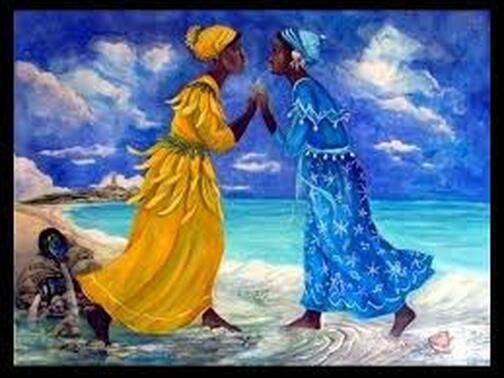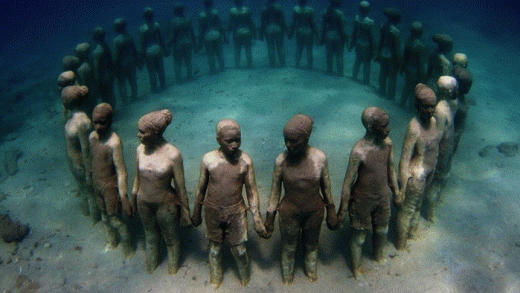One of the most challenging things for newcomers to the religion to accept is that there are rules about how things must be done, but the rules seem to vary from place to place and even from person to person, depending on who you ask. What are these rules about the religion? Where do they come from? Can they ever be changed? What happens if I don't agree with the rules? These are some of the questions that come up all the time when people start asking about the religion, so let's take a look at them here.
Choose your tradition and community
 Where do you belong?
Where do you belong? First, we have to remember that Orisha worship takes different forms in different communities, each one tied originally to a geographic location. Although all Orisha-based religions originated in West Africa, they spread through the Atlantic slave trade and migration to the Americas over several centuries, and they took root in new homes, sometimes experiencing organic changes due to new circumstances. In Cuba, the religion became known as Lukumí or Regla de Ocha (also called Santería). In Brazil, it became known as Candomblé. In Western Africa, its home, it varied from one region to another and changed over time because religions are living things that correspond to human conditions. Political and social change on a grand scale, such as the uprooting and displacement of large groups of people, civil wars, the usurpation of political control by one group over another -- these are factors that bring about changes in customs and traditions. But, one of the remarkable aspects of all our traditions is that our ancestors managed to keep the essence of the religion true to the teachings of their ancestors, thus ensuring continuity within times of chaos and social change. Negotiating what needed to change, why, and how to incorporate that change into the cosmology of the religion without changing its essential nature was complicated work, done by the community of priests, elders, and with the help of divination, to tweak an existing system of belief to correspond to changes forced on people by external circumstances. An example is the substitution of coconut pieces to replace Obi kola in divination. In colonial Cuba, kola nuts weren't available, and coconut was the closest thing they could find. Our religion is practical, and adapts when it must to new situations. But, these changes are never arbitrary or at the whim of one person. The rules for divination remained the same, but the tool changed because there was no other choice. Changes must be condoned, sanctioned and accepted by a whole community because, no matter how strong one individual may be, no single person has all the knowledge, and no one person can rule the whole religion.
The first step for understanding how the religion works and what the rules are is to identify which tradition you're going to follow. If you're going to belong to a Lukumí community, or a traditional West African community, or a Brazilian community, be clear about the choice you've made and stick to that while you're in your learning mode. Trying to learn about them all at the same time, especially if you're new to the religion, leads to confusion and frustration. The choice you make might be based on personal preference or cultural identity, but it's likely that for many people the choice depends on who is your godparent. Many people find their way into the religion through personal contacts. If you find a Lukumí godparent who seems to be a good match for you, and you establish a respectful bond with that person, your godparent will be the one to explain to you how the religion works, as you go along. Naturally, the explanation will reflect the Lukumí system of belief, and will be based on what people have learned from their own godparents, and from knowledge of that particular branch of the religion. This explains why so many people begin their explanations by saying "In our house..." or "In our lineage..." No one can speak on behalf of the entire religion; knowledge doesn't reside in one place only. Elders will speak about how things must be done from their own experience in the religion, and there's no way to prove that one house or one lineage is more authentic or more correct than another. This is also true when we go across traditions. Despite strong opinions people might have, no tradition can claim to be more real or more authentic or more powerful than another. Every system of belief goes back to ancestors who shared a common heritage and a common knowledge base. There's nothing inherently "better" about one tradition over another. Don't waste your time debating that point. Choose one, and stick with it. Your identity as an Orisha devotee will grow according to the tradition you embrace.
Letting go of old ways of thinking
 Don't let your ego get in the way
Don't let your ego get in the way Once you start your journey down a particular road, take plenty of time to adjust to a new way of seeing and thinking about the world around you. If you weren't raised in a culture where the cosmovision of Orisha worshippers was part of your upbringing, you need to learn how to think in a new way. Western logic and reasoning doesn't always apply to this new worldview you're developing. If you insist "why?" all the time, and demand answers that make sense to you, using your old way of thinking, you're going to be constantly frustrated and angry that things aren't "making sense" to you. Impatience works against you, because your head needs time to shift into a new paradigm. Ego also works against you, because no matter how smart you are, and no matter how assured you are in your ability to understand everything, you find out quickly that there are lots of things that you don't understand, can't understand, and you become dependent on elders who tell you how things are, reducing you to a position of "student" rather than "colleague." There's a hierarchy in the religion, whether you like it or not. People with many years in the priesthood, who are respected by the community and considered knowledgeable, are not your equals when you're just starting your path in the religion. Whether you like them or not, whether you agree with them or not, it's not your place to argue with them and tell them they're wrong. Taking a defensive position and demanding a debate about an established rule or tradition is going to cut you off immediately from any future teaching and learning opportunity. If you want to learn, you need to be quiet, listen, and reflect on what you're being told. You don't have to blindly accept it. Analysis is always good. But until you have the mental tools (new worldview) to process the information, it's good to be patient and let the information come, trying to remain neutral about it and not form judgments about things you don't understand fully.
There's no sacred text in written form (like a Bible) in our religion. For many centuries, all information was passed from generation to generation in oral form. We consider the information sacred, even though it's not written, and we also believe that it is codified by repetition and practice. We learn how to do things by observing and participating. We learn by asking questions, but mainly, we learn by listening. We digest the information and internalize it; eventually it becomes a natural process for us and we simply "know" something because it's part of our reality and our worldview. No elder has time or interest in sitting down with you and telling you everything they know, like a machine that spews out information on demand. Elders have lives, too, and responsibilities and demands on their time. Unrealistic assumptions that you will quickly learn everything and your godparent will devote himself/ herself to you full time until you understand it all lead to a lot of frustration and disappointment. Learning happens in small bits, over time, from being present, observing, listening, doing. Some godparents are better than others at explaining things, and some are more interested in teaching than others. No one "owes" you anything, other than respect and courtesy and spiritual guidance. Take every opportunity you have to spend time with your godparent and your community and ask questions when people aren't busy or preoccupied with other things. Over time, you'll find that you've learned a lot, even if it's not in a formal, organized way.
There's no sacred text in written form (like a Bible) in our religion. For many centuries, all information was passed from generation to generation in oral form. We consider the information sacred, even though it's not written, and we also believe that it is codified by repetition and practice. We learn how to do things by observing and participating. We learn by asking questions, but mainly, we learn by listening. We digest the information and internalize it; eventually it becomes a natural process for us and we simply "know" something because it's part of our reality and our worldview. No elder has time or interest in sitting down with you and telling you everything they know, like a machine that spews out information on demand. Elders have lives, too, and responsibilities and demands on their time. Unrealistic assumptions that you will quickly learn everything and your godparent will devote himself/ herself to you full time until you understand it all lead to a lot of frustration and disappointment. Learning happens in small bits, over time, from being present, observing, listening, doing. Some godparents are better than others at explaining things, and some are more interested in teaching than others. No one "owes" you anything, other than respect and courtesy and spiritual guidance. Take every opportunity you have to spend time with your godparent and your community and ask questions when people aren't busy or preoccupied with other things. Over time, you'll find that you've learned a lot, even if it's not in a formal, organized way.
It's all about finding the right balance in attitude
 Find the right balance in your attitude
Find the right balance in your attitude The "rules" we learn about how things are, or how things should be done, are part of this inherited body of wisdom that we call "Ifá." The interpretation of Odu, each with their patakines (stories) and proverbs, gives us knowledge about the religion and the rules. Prohibitions are usually explained through a story of something that happened to one of the Orishas because of disobedience, poor choices, or hard lessons learned. Hierarchies are explained through the relationship of the Orishas to each other and to the creator, Olodumare. Some rules, such as the way we perform ceremonies or who has license to do them, are codified through custom, tradition and practice. If a ceremony has been done a particular way for more than 100 years, and the community accepts that this is the correct way to do the ceremony, it becomes one of the rules of the house or the lineage to do the ceremony that way. Our religion is communal, and individuals need to belong to a community. Individual egos and strong opinions that aren't based on knowledge and tradition will create disruptions, chaos, and bad feelings in the community, especially when coming from a newcomer who challenges others just for the sake of imposing their own opinions on everyone else.
No one should be forced to accept things that they find morally or ethically wrong. If you strongly disagree with some of the fundamental principles of the religion, such as the need for animal sacrifice on some occasions, then the religion simply isn't for you. Find another way to meet your spiritual needs, because you can't start dismantling an entire system of beliefs to fit your individual opinions. If you think initiation isn't necessary in order to assume priestly functions, you aren't going to be welcome or accepted in any legitimate community. You'll be practicing in isolation a religion of your own invention. All people can be Orisha devotees, whether they're part of the religion or not. It's possible to love and honor the Orishas on your own, but if you want to be part of a community of Orisha worshippers and benefit from the knowledge and experience of that community, you have to be willing to respect the fundamental rules that must stay in place to preserve the tradition and integrity of the elders' teachings and of the wisdom that Olodumare passed down to us through the teachings of Ifa.
No one should be forced to accept things that they find morally or ethically wrong. If you strongly disagree with some of the fundamental principles of the religion, such as the need for animal sacrifice on some occasions, then the religion simply isn't for you. Find another way to meet your spiritual needs, because you can't start dismantling an entire system of beliefs to fit your individual opinions. If you think initiation isn't necessary in order to assume priestly functions, you aren't going to be welcome or accepted in any legitimate community. You'll be practicing in isolation a religion of your own invention. All people can be Orisha devotees, whether they're part of the religion or not. It's possible to love and honor the Orishas on your own, but if you want to be part of a community of Orisha worshippers and benefit from the knowledge and experience of that community, you have to be willing to respect the fundamental rules that must stay in place to preserve the tradition and integrity of the elders' teachings and of the wisdom that Olodumare passed down to us through the teachings of Ifa.

 RSS Feed
RSS Feed
